BAGHDAD – Warid Badr Salim’s front-page satire in a recent edition of the newspaper al-Mada compared Iraq’s parliament to wolves stalking sheep – the Iraqi people – and cheekily suggested its members need the diplomatic passports they’ve awarded themselves just to leave Baghdad’s fortress-like Green Zone.
Salim’s essay reflected the dismal regard Iraqis have for their politicians, but the politicians were not amused.
In the midst of parliament’s debate over Iraq’s pivotal January elections, a lawmaker held up the article and denounced it. More than 150 lawmakers signed up to sue the paper.
Iraqi journalists, long used to physical attacks, are facing a new kind of threat from expensive legal actions and interference from the powerful political parties that dominate the government.
The chilling atmosphere for the news media was underscored last week when an Iraqi court fined the London-based Guardian newspaper nearly $87,000, claiming it had defamed Prime Minister Nouri al-Maliki. An article in the paper in April quoted unidentified Iraqi intelligence officials describing what they said was al-Maliki’s increasingly authoritarian rule.
Al-Maliki’s office issued a statement denying he was behind the Guardian lawsuit.
“Freedom of expression is a right that is guaranteed by the constitution,” it said.
Free expression is one of the few benefits Iraqis count from the March 2003 U.S.-led invasion. Basic services such as electricity and sewage are still in disrepair, and sectarian violence, while much reduced, is still a daily occurrence.
The backlash against journalists and curbs on books, cartoons and plays, often for religious reasons, raise questions about what kind of society the United States will leave behind when American troops withdraw from Iraq at the end of 2011.
Ibrahim al-Saraji, the head of a private group that defends Iraqi journalists, said when he met Western experts recently, “I told them that the achievements that you made for the Iraqi people might collapse in one minute.”
The organization Reporters Without Borders said last week there’d been “a big upsurge in complaints” against Iraqi newspapers. The planned legal proceedings against al-Mada “are very worrying, since they demonstrate an inability to tolerate any criticism,” the group said.
By the Middle East’s restrictive standards, Iraq’s news media remain rollicking. More than 500 satellite newsgathering vehicles are estimated to operate in the country. There are more than 50 daily newspapers, many of them tied to political parties or to the government but some of them independent.
Clashes between journalists and newly aggressive security forces, often resulting in injured reporters, have increased in the wake the Oct. 25 bombings of government buildings in Baghdad, in which 155 people were killed.
“The problem here … it’s not that there are restrictions on journalism, but that there is chaos in journalism,” Ali Mousawi, a top al-Maliki adviser for media affairs, said in an interview with McClatchy Newspapers.
Mousawi said he didn’t agree with the lawsuit against al-Mada, saying he found Salim’s essay “ordinary.” However, he said it was too much to expect Iraq to transition from the late Saddam Hussein’s brutal dictatorship to democracy “without these problems.” Independent journalism was impossible under Saddam.
Mousawi said the fault lay not with the government but with sectarian political parties, which retained their own, much-feared militias.
“You can ask any journalist. He can go in the street and criticize the government freely. But it’s not easy to criticize the parties or the militias,” he said.
It was al-Maliki himself, or those close to him, however, who boosted the legal assault on the media. In May, using a 1969 law, al-Maliki sued a freewheeling Web site based in Germany, Kitabat, for $1 million for alleging nepotism by his chief of staff, but he withdrew the suit after a domestic and international outcry.
“Maliki started this dangerous precedent,” Salim said in an interview at al-Mada’s offices, where editors were meeting to compose their response to the latest lawsuit.
Still, Salim said, more than the government, he fears individual politicians, their parties – and the militias.
“Saddam was one person… Now each person of the new Iraq government, I mean the officials, each of them wants to be Saddam,” he said. “Some of them try to make us return to square one,” and the first thing they do “is to put restrictions on journalists’ freedom.”
“I’m afraid of assassination,” he said, adding although he could return to exile in the United Arab Emirates, “I will never leave.”
Since 2003, 250 Iraqi journalists have been killed, according to the Iraqi group Martyrs of Journalism.
Iraqi-American journalist Emad al-Kafaji resigned Oct. 20 from the semiautonomous Communications and Media Commission to protest what he said was political interference by board members.
Former U.S. proconsul L. Paul Bremer created the agency as a rough equivalent of the U.S. Federal Communications Commission. Parliament was supposed to appoint board members, but instead al-Maliki has, al-Kafaji said.
“They got more and more involved in our business,” al-Kafaji said, hiring workers and writing news items for publication. “It’s unprofessional, and it’s not good.”
On Oct. 27, two days after the huge Baghdad bombings, the commission, apparently acting at the behest of Iraq’s security forces, announced satellite news trucks had 24 hours to get licenses or they’d be prohibited from working. After news organizations protested, the registration period was extended.
“It’s always a battle between the politicians and the independent journalists,” al-Kafaji concluded.
“They would like to be like Saddam – as strong as Saddam, not like him. They cannot do that right now. It’s a different country; it’s a different era.”










